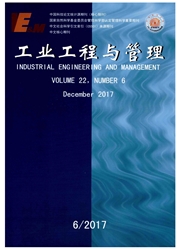

 中文摘要:
中文摘要:
针对多目标独占性电动汽车路径问题,提出了基于时间敏感系数的客户满意度评价函数,时间敏感系数体现了客户对未能在指定的时间窗口内得到服务的容忍程度。在此基础上构建了该问题的一个新的混合整数规划模型,其优化目标为最小化车辆空载行驶里程的同时,最大化客户满意度。为了提高粒子群算法的全局搜索能力,提出了通过增加粒子去心邻域最优值,从而增加粒子共享信息类型的改进粒子群算法,并从粒子更新方向的角度分析其改进机理。针对客户均匀分布和非均匀分布的两个测试算例的求解结果验证了改进粒子群算法能得到更好的解。对时间敏感系数的分析结果表明,在保持客户满意度水平一定的前提下,运输企业的运营成本随着客户时间敏感系数的增大而增加。
 英文摘要:
英文摘要:
In the multi-objective exclusive electric vehicle routing problem, the evaluation function for customer satisfaction was proposed based on time sensitivity coefficient, which reflects the tolerable degree for failing to receive service within a specified time windows. To handle with the problem, a new mixed integer programming model was built with the aim of both maximizing the customer satisfaction and minimizing the vehicle's no-load mileage. In order to improve the global search capability of PSO (Particle Swarm Optimization), an IPSO (Improved PSO) was developed by adding the optimal value of particle's deleted neighborhood to increase the particle sharing information, and the improvement mechanism for IPSO is analyzed from the point of view of particle updating direction. Experiments for two cases with customer's uniform distribution or non-uniform distribution demonstrate that IPSO algorithm can obtain better solutions. The analysis of time sensitivity coefficient shows that the operating cost of the transportation enterprise increases with the rising of time sensitivity coefficient under the premise of maintaining the level of customer satisfaction.
 同期刊论文项目
同期刊论文项目
 同项目期刊论文
同项目期刊论文
 期刊信息
期刊信息
